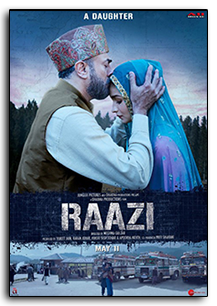

Charlyne Gelt Ph.D.
Connections!
Upcoming Events
Chapter News
Nazila Amighi
President's Message
Read
Ariel Cohen
CAMFT Facebook Page
Legislative Updates
Read
Kirstin Carl
September Membership
Meeting Write-Up
Read
September Board Minutes
Read
Member Columnists
Charlyne Gelt
Raazi
Read
Quentin Dunne
The Gift of Therapy
Read
Member Highlight
Ella Armine Weiss
Read
Contact Us
Read
Sponsors
AATBS
Read
Newport Academy
Read
Cliffside Malibu
Read
eBlasts
October 2018 eBlasts
Read
November 2018 eBlasts
Read
Cinema Therapy — Charlyne Gelt, Ph.D.
Raazi
“All the world’s a stage,
And all the men and women merely players;
They have their exits and their entrances,
And one man in his time plays many parts.”
(Shakespeare’s As You Like It Act II Scene VII)
Set against the framework of the India-Pakistan war in 1971, RAAZI is an espionage thriller about a young Kashmiri University student, Sehmat (Alia Bhatt), whose father, Hidayat Khan (Rajit Kapoor), a dying freedom fighter, places his devotion to his country above all else. He decides to marry-off his only daughter to a Pakistani  army officer, Iqbal Syed (Vicky Kaushal) so she can be a spy for her country. Sehmat’s mother opposes the idea, but Sehmat agrees to be a substitute for her failing father as she wants to please him and support his mission. An underlying theme is Sehmat’s fierce internal conflict: love and devotion for her father, her country, and the love that develops for her Pakistani husband. The film, adapted from the 2008 novel Calling Sehmat by Harinder Sikka, is based on a true story.
army officer, Iqbal Syed (Vicky Kaushal) so she can be a spy for her country. Sehmat’s mother opposes the idea, but Sehmat agrees to be a substitute for her failing father as she wants to please him and support his mission. An underlying theme is Sehmat’s fierce internal conflict: love and devotion for her father, her country, and the love that develops for her Pakistani husband. The film, adapted from the 2008 novel Calling Sehmat by Harinder Sikka, is based on a true story.
After rigorous training under an Indian intelligence agent Khalid Mir (Jaideep Ahlawat), the naïve and inexperienced Sehmat marries Iqbal, then crosses the border into Pakistan to live with him and his welcoming military family. Once in Pakistan, her whole world changes as she tries to balance her new roles as a devoted wife, and unacknowledged secret agent. The latter role places her in increasingly dangerous situations as the impending war between the two countries heats up. Complicating matters is the fact that Sehmat ― not according to plan ― finds herself falling in love with her husband. She quickly settles into married life, adjusts to her new country, and establishes the trust and confidence of her in-laws. She is torn by conflicting feelings, love and loyalty for her father and fatherland, and her blossoming marital bond.
As a spy, Sehmat must keep her true loyalty hidden from her Pakistani family while she establishes communication channels with her handlers in India. Schmat’s life is under constant peril as she uncovers vital information to hand over to India. Danger lurks in every gathering and behind every doorway as she sneaks into the militarized palace rooms and roams the streets of Pakistan passing on secret information about a plot against India. Under constant threat of exposure, Sehmat passes the plot’s details to her handlers in India. That plot encompasses an attack on the Indian aircraft carrier INS Vikant, then deployed in the Bay of Bengal. This early warning may have had bearing on the sinking of the Pakistani submarine PNS Ghazi off Visakhapatnam on the Indian coast. It is now regarded as one of the high points of India’s military victory.
Finally, Sehmat is found out as being a spy. While she manages to escape with the help of her handlers, it is at the cost of Iqbal's death. Upon her return to India, Sehmat discovers that she is pregnant with Iqbal’s child. She becomes depressed, begins to question the meaning of her life, her allegiance to her father and her fatherland, and her role as a spy. She feels guilt and remorse at causing her husband’s and other unnecessary deaths, and the toll of war.
Psychological Implications
To understand the psychological implications of Raazi from a depth perspective we can apply two templates: the Hero’s Journey and the Father’s Daughter. On the psychological stage, Sehmat’s quest reflects the archetypal hero’s/heroine’s journey as expressed in Joseph Campbell’s work, “The Hero with a Thousand Faces.” Crises pushes her out, she leaves her family home (lunar birth) and ventures beyond the known (leaving home), where she experiences many trials and tribulations, and these experiences change her. Searching for meaning, finding love, (the treasure, the booty), she then returns home, transformed. What gets awakened in her hero’s journey is an “inner force,” the omnipresent energy inherent in all of us ― the drive to move from the known into the unknown then return home with an expanded consciousness and new sense of self.
RAAZI is not just an India versus Pakistan story. It is also a story of human relationships and conflicting perspectives on love and loyalty. Sehmat’s journey as a spy results in her subtle transition from a sheltered, gullible college student, a maiden mind-set, to a determined woman who becomes an informant for the Indian intelligence bureau. Her beauty is but a façade, a mask that hides unacknowledged aspects of herself, her capacity for lies and deception, and her true strength of character.
The film’s visual landscapes parallel Sehmat’s internal conflicts over cultural and political changes swirling around her. The beauty and grace of Kashmir, her family home, and the wealth and palaces of her husband’s military family are in sharp contrast to the many places she journeys in her mission as a spy ― the dangerous streets, the harsh environments ravaged by poverty, and the vendor stalls of the militarized zones of Pakistan.
Sehmat’s journey in RAAZI can be understood as a metaphor for the challenges we all face on our own journeys. They inspire us and show us ways to solve the puzzle of our own personal conflicts. In various ways, we all have the opportunity of call, departure, crisis, temptation, and fulfillment. Along this journey, we learn about the unknown, alien, shadowy aspects of the self. Like Sehmat, we become aware of the masked, deceitful parts that are hidden behind veiled smiles and silk. In the beginning, Sehmat uses her love for her father and fatherland as a way of justifying her deceitfulness, but as her love for her Pakistani husband grows, that justification becomes harder to accept. She is torn and traumatized over her role as a spy. Though aware of her own duplicity, she is unable to integrate this internalized split.
A “Father’s Daughter”
Sehmat’s character represents a “Father’s Daughter,” meaning a daughter who is unconsciously aligned with the values of the patriarchy and the masculine principle (Woodman, 1982), as well as with the values of the personal father. Emotionally bonded with the personal father, she serves his needs, mirrors his pain and woundedness while being cut-off from her own. The feminine aspects of the self also get sacrificed to meet the father’s emotional needs. Sehmat took on the role of spy, which earned paternal approval; it also put her at odds with her mother, her own feminine and emotional side.
Sehmat’s Pakistani husband is able to “see” her, which awakens her repressed feminine nature and enables her to evolve from mirroring the values of her father, trying to do what he wanted, to discovering her own inner, intuitive feminine nature. This illustrates Sehmat’s transformation from emotional slavery to emotional liberation.
Sehmat’s role as a Father’s Daughter serves as a useful template to look at unconscious belief systems that keep a daughter stuck in a “maiden” mind-set, serving the father’s needs while unaware of her own. Sehmat evolves and makes the transformative journey from “home” into the unknown, then returns home transformed, “reborn.” She evolves from a naively carrying out her father’s legacy, his values, to a woman whose budding devotion sets her on a path to becoming a woman who knows herself and her own emotional needs. The unborn child she carries can be understood as a metaphor for an integration of the dualities, the splits, the “father god” she served.
The Harder Questions
RAAZI also leaves us questioning the repercussions of war on the human psyche. The Indo-Pakistan war, like other wars, resulted in many tragedies and deaths. How can society come to terms with its past? How can it acknowledge responsibility?
As the result of her mission, Sehmat becomes self-reflective, questions her own values and the meaning of her life. Now, rather than looking to her father (and fatherland) for her moral direction, she seeks guidance inward for answers to questions about right versus wrong, good versus bad, and why people on one side of a border are considered heroes, while those on the other side are seen as villains. She has seen bravery exhibited on both sides, and she has seen how trauma can shrink people’s characters and make them small. She also “knows” the shame of “blood on her hands.” Sehmat, a 20-year-old unsung hero, gave a "strong sacrifice for her country.” She ended up living as a recluse in Punjab, battling depression over her guilt and responsibility for murders and the death of her husband.
RAAZI recognizes a women’s buried strength and resilience, and the sadness at knowing how easily a woman’s “gold” gets used and abused to serve the needs of others. Sehmat turns to spirituality to integrate the dualities.
"Love is an involuntary gift that manifests unplanned." — Riaz Ahmed Gohar Shahi
Charlyne Gelt, Ph.D. (PSY22909) is a clinical psychologist who practices in Encino. She leads Women's
Empowerment Groups that help women learn the tools to move beyond self-destructive relationship patterns.
She may be reached at 818.501.4123 or cgelt@earthlink.net. Her website is www.drgelt.com. Her office address is
16055 Ventura Blvd. #1129 Encino, CA 91436.